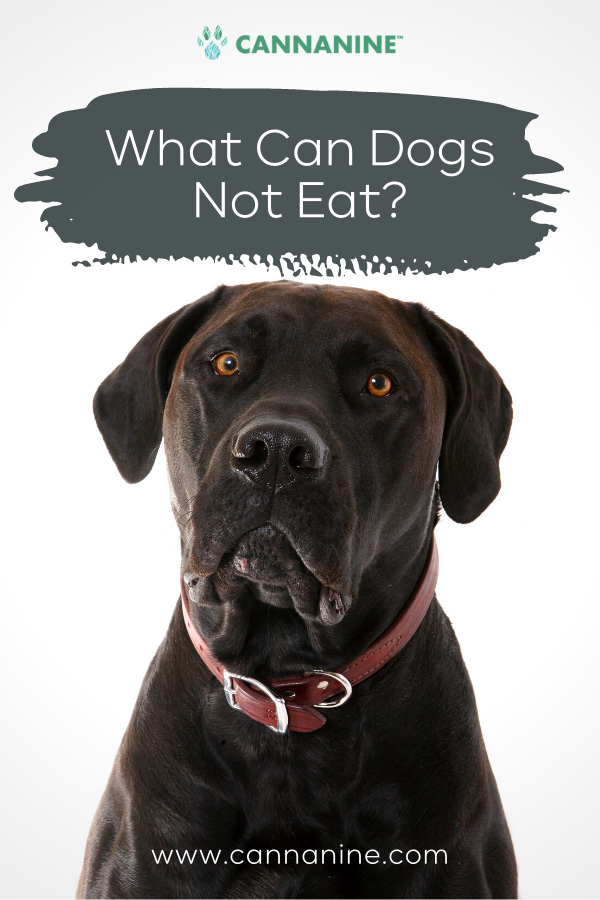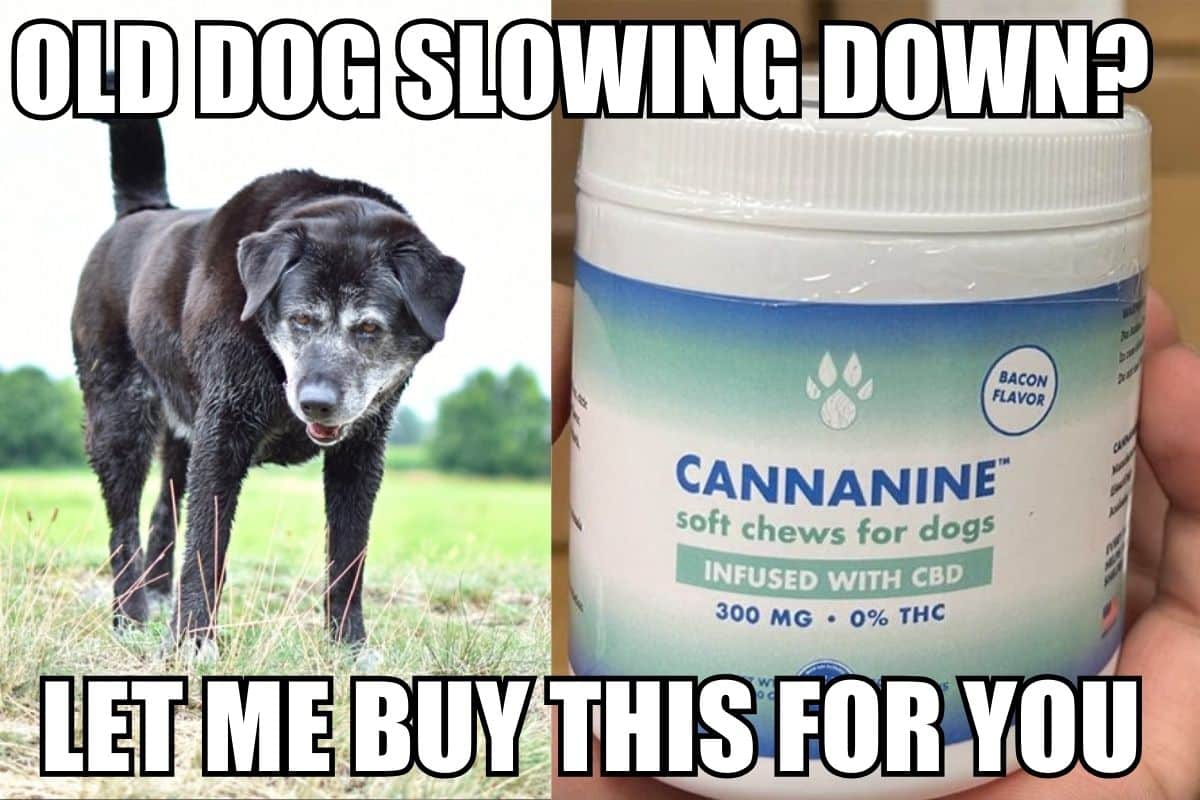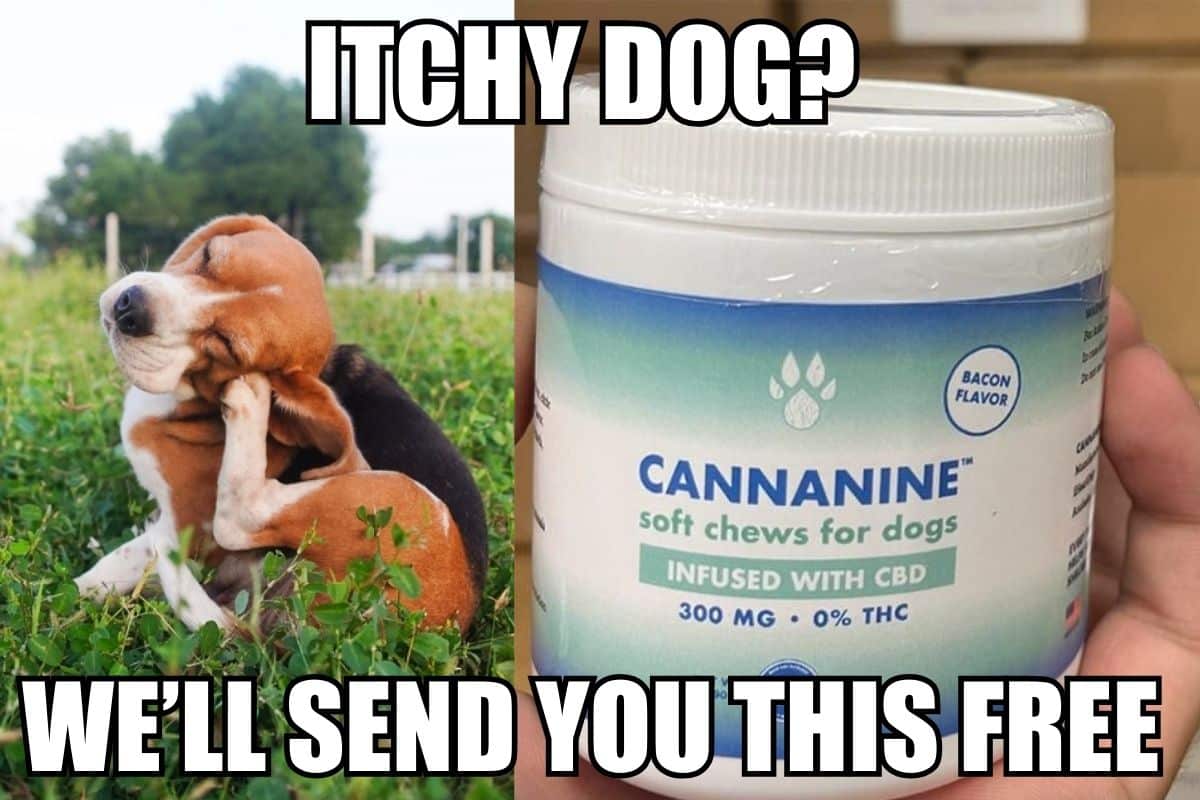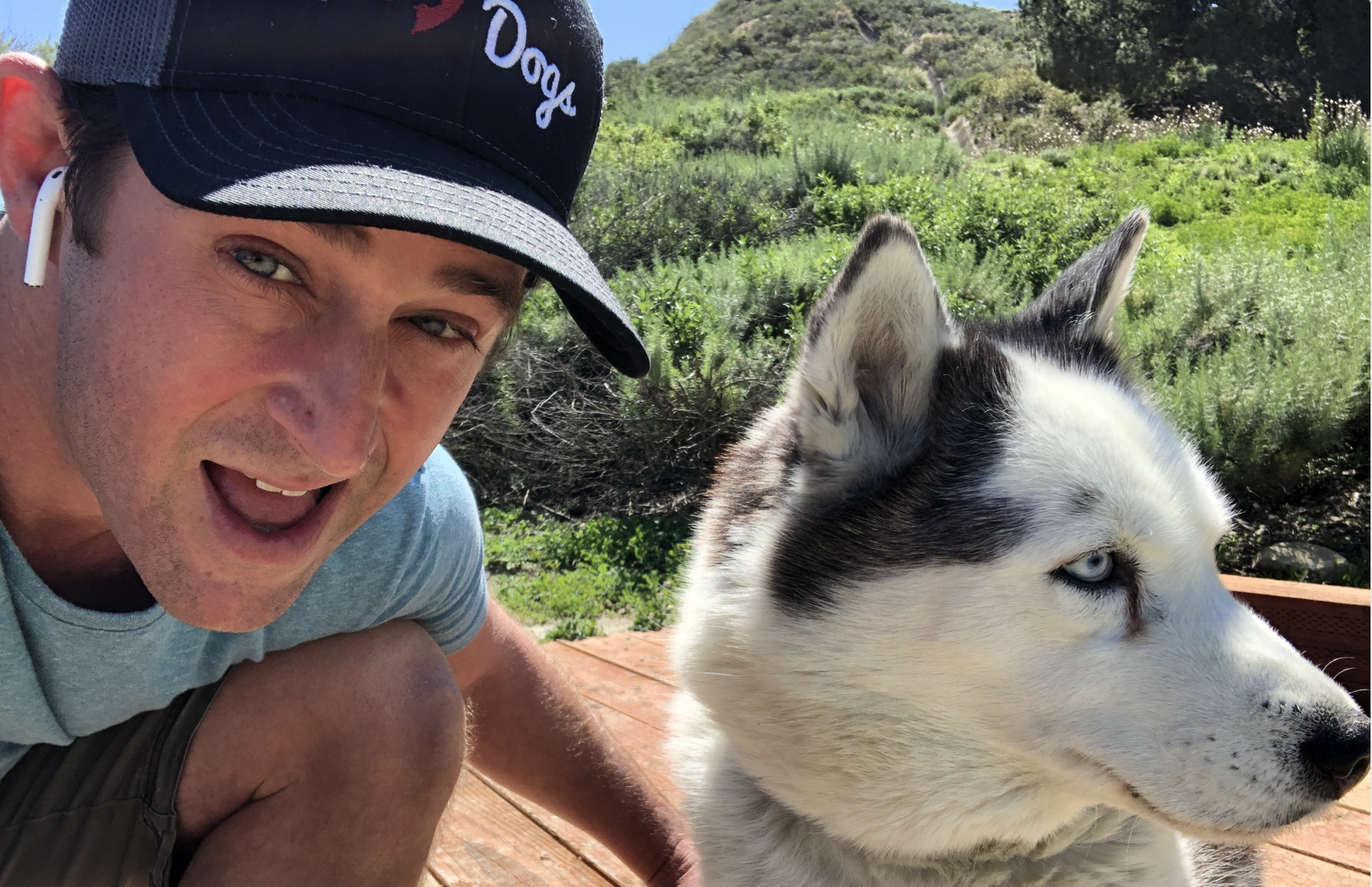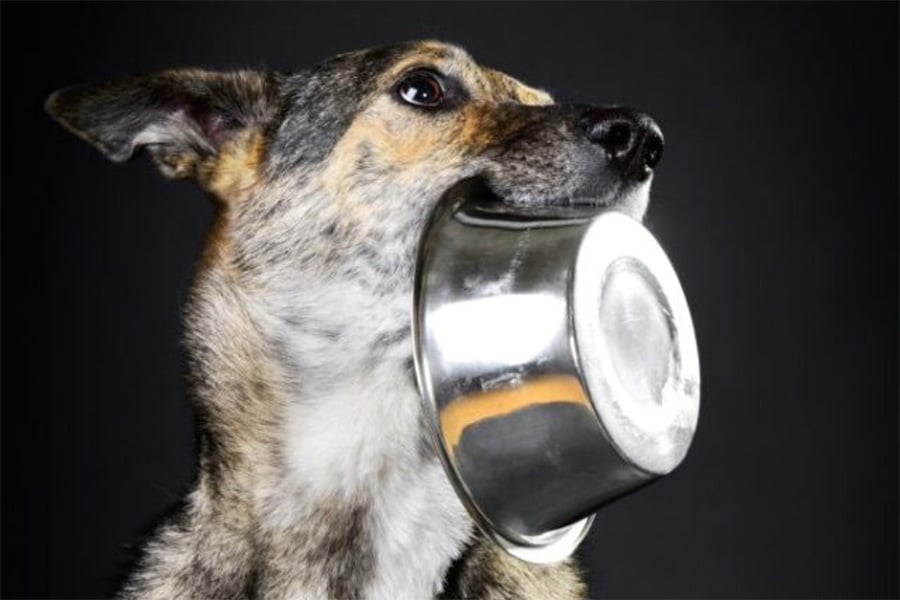
What Can Dogs Not Eat?
What can dogs not eat? Today, we’ll look at some individual foods and discuss whether or not they’re safe for dogs.
Lots of dog owners second-guess the idea of giving their pet the same meal day after day. Everybody else in the family gets lots of variety, so shouldn’t your pooch get to share in the fun?
Sharing meals and snacks with our pets is a bonding activity as old as pet ownership itself. It’s a nice way to make a furry friend feel included. Their joy is contagious when rewarded with a favorite snack.
Of course, we all know that some foods aren’t safe for sharing. This makes many dog owners wary of serving up anything but packaged dog food. If you haven’t done your homework, then caution is definitely the best policy.
However, lots of people foods are safe and healthy for dogs.
Learn Which Foods Are Dangerous For Dogs
To stay safe, keep a list of which foods are okay to share. Avoid spontaneous sharing—that’s how many dogs become ill.
Be aware of which items should absolutely never be consumed. These include (but aren’t limited to):
- Chocolate (dark chocolate, milk chocolate, all types)
- Macadamia nuts
- Avocado
- Alcohol
- Grapes and raisins
- Cooked bones
- Xylitol (an artificial sweetener)
- Corn on the cob
- Garlic, onions, and chives
A variety of concerns, like kidney failure and liver failure, make each of those foods quite dangerous. Macadamia nuts affect the nervous system, while corn cobs can cause a blockage in the intestine.
Lots of other foods that we enjoy occupy more of a gray area for our pets. They’re safe when served in moderation, although not necessarily part of a healthy diet. That’s why it’s important to exercise caution and introduce new foods slowly and thoughtfully.
After your pup samples a new dish or ingredient, monitor how they feel afterward. Then decide whether that item can be added to your pet’s approved food list.
To help get you started, let’s review some foods that dog owners commonly wonder about.
From blueberries to steak, here’s a rundown of 23 people foods that may or may not be smart choices for sharing with your pooch.
But first: a quick review on the basics of canine nutrition.
What Does A Healthy Canine Diet Consist Of?
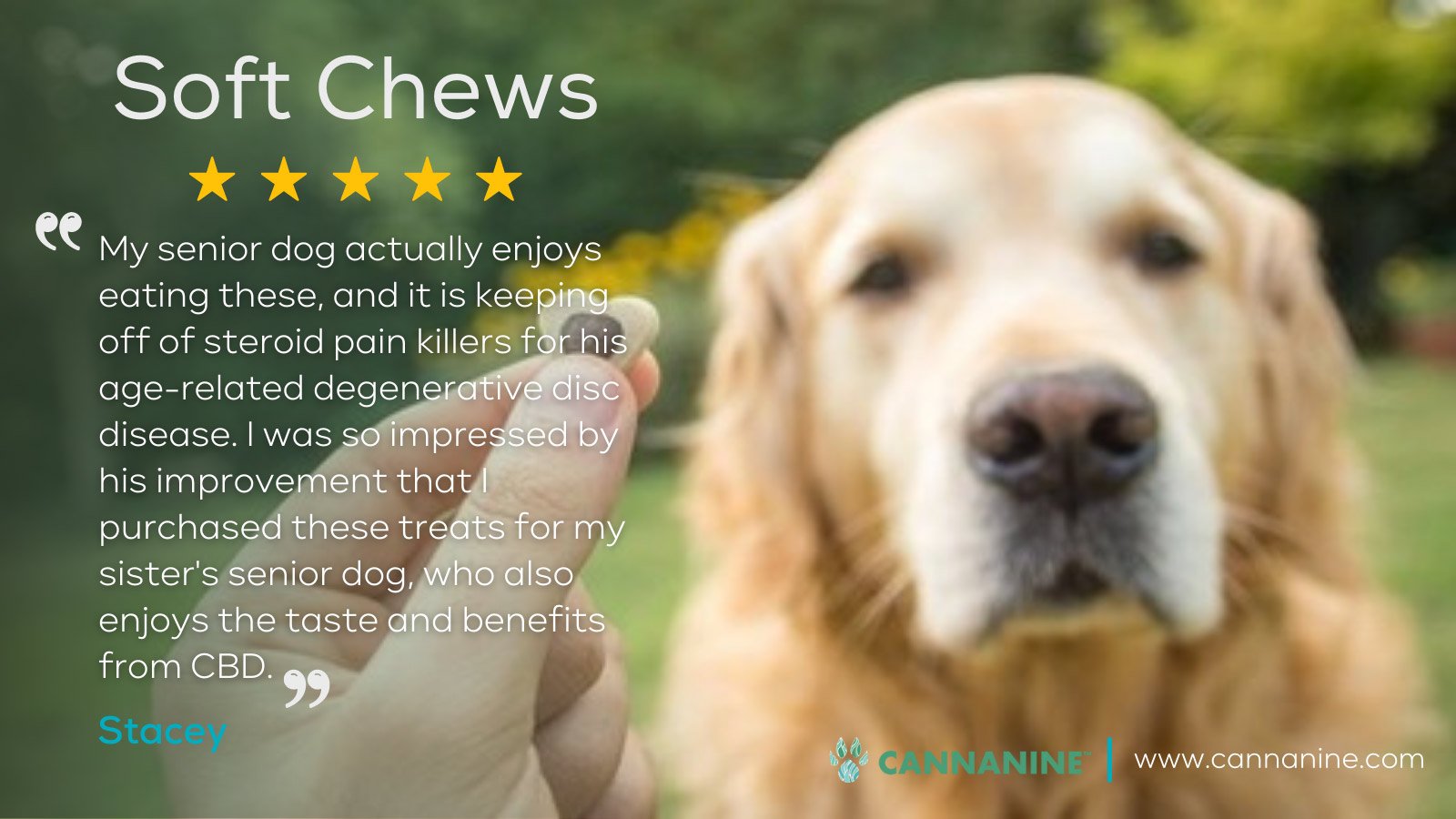
The overall ins and outs of a healthy canine diet is a big topic. Let’s just quickly review some of the key facts before we get started on our foods list.
Dogs, like humans, are omnivores. They do favor meat, of course, and they’re closer to being carnivores than we are. Yet, plant-based components are normal and healthy within a dog’s diet.
Quality and digestibility are more important than source when it comes to proteins. So, the key question is not whether or not the protein is animal-based or plant-based.
In fact, a dog can thrive on vegetarian foods but would struggle with a 100-percent-meat diet. Meat is a great main ingredient, but on its own, it won’t meet all of a dog’s nutritional needs.
Dogs need these six vital nutrients:
- Water
- Protein
- Carbohydrates
- Fats
- Vitamins
- Minerals
Not too much salt, not too much sugar. The diet should be richest in protein and fat, which are the primary energy sources.
Carbs serve as an energy source too. They’re digested better when cooked. Meals shouldn’t be carb-heavy, generally speaking. They’re a secondary energy source, and carb-rich foods tend to have undesirable attributes such as high sugar content.
It’s often guessed that raw meat is a great choice for any canine. However, domesticated dogs are not wolves. They’ve evolved to digest cooked foods. Serving up raw meat carries health risks for both dogs and their owners.
Safely Adding New Foods to a Dog’s Diet
Your pup’s dietary needs are dependent on a variety of factors, to sum up neatly. There’s breed, age, lifestyle, intolerances, etc.
Dog food is also surprisingly complicated to analyze.
It’s best to talk to your veterinarian to help choose healthy sources and quantities for feeding your pet.
When it comes to sharing people food with pups, exercise caution. The good news is that lots of our foods make tasty treats. What’s important is to do some research before introducing new food and to serve people foods in moderation.
Now, let’s dig into our list to see which treats are safe to share. Here’s everything we cover:
- Can Dogs Eat Blueberries?
- Can Dogs Have Strawberries?
- Can Dogs Eat Grapes?
- Can Dogs Eat Raisins?
- Can Dogs Eat Oranges?
- Can Dogs Have Pineapple?
- Can Dogs Eat Potatoes?
- Can Dogs Eat Raw Chicken?
- Can Dogs Eat Rice?
- Can Dogs Eat Nuts?
- Can Dogs Eat Peas?
- Can Dogs Have Carrots?
- Can Dogs Eat Spinach?
- Is Watermelon Good for Dogs?
- Can Dogs Eat Coconut?
- Can Dogs Eat Ice Cream?
- Is Cheese Bad For Dogs?
- Can Dogs Eat Cabbage?
- Is Milk Bad For Dogs?
- Can Dogs Eat Pretzels?
- Can Dogs Eat Pasta?
- Can Dogs Eat Ketchup?
- Can Dogs Eat Peanut Butter?
- Can Dogs Eat Steak?
Can Dogs Eat Blueberries?
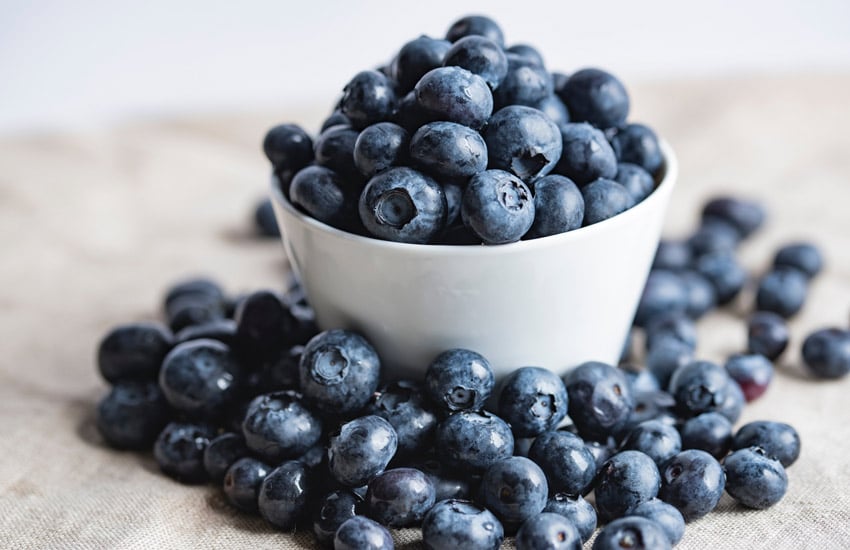
Yup, it’s safe for dogs to eat blueberries. They make for a healthy snack—high in Vitamin C, fiber, and low in calories. Plus, pups tend to enjoy them.
Research has also suggested that the antioxidants found in blueberries can help reduce brain aging. So, that’s an extra incentive for senior dog owners to choose blueberries as a healthy treat.
Can Dogs Have Strawberries?
Yes, doggos can enjoy munching on tasty ripe strawberries. Like blueberries, strawberries are rich in Vitamin C and fiber and safe for canine digestive systems.
Can Dogs Eat Grapes?
No, grapes are not okay. The exact source of toxicity is unknown, as is the amount that’s likely to cause harm.
However, we know that grapes can cause kidney failure for dogs. Avoid this food completely.
Can Dogs Eat Raisins?
Raisins are dried grapes. As noted above, no grapes. No raisins, either.
Can Dogs Eat Oranges?
Oranges contain more sugar than most foods that you serve your dog. They could also cause an upset tummy if a large amount is consumed. However, oranges aren’t toxic. They’re fine in small quantities, but it’s best to avoid them if your pet is overweight or has diabetes.
Can Dogs Have Pineapple?
Like oranges and many other fruits, pineapple is full of vitamins and nutrients. It’s also got plenty of sugar and doesn’t fill a particular need that your pooch is likely to be lacking. However, pineapple isn’t toxic.
So, a few small bits of raw pineapple are okay. However, don’t share canned pineapple. The syrup that canned fruits soak in is just too sugar-packed for a dog’s digestive system.
Can Dogs Eat Potatoes?
Dogs cannot eat raw potatoes. They contain solanine, a compound toxic for many dogs.
Cooked potatoes are okay in small amounts. They’re high in carbs and aren’t a particularly healthy snack. Yet, cooking reduces solanine and thus toxicity.
While a bit of cooked potato is okay here and there, there are many other healthier and tastier options to choose as treats.
Can Dogs Eat Raw Chicken?
Raw chicken is a “maybe.” Chicken is a common dog food ingredient. Dogs can eat cooked chicken, too.
Serving chicken raw is generally not recommended. There’s a risk of salmonella and other bacterial infections. This could affect the dog or the person serving the dog.
Canines do have strong stomach acid that would help fend off infections. So, some owners choose to include raw chicken on the menu. If you’re interested in this, do some additional research and proceed cautiously.
Keep in mind that some dogs are allergic to chicken. So, keep an eye out for discomfort when you introduce this food.
Can Dogs Eat Rice?
Dogs can eat rice. In fact, it’s an ingredient in many dog foods.
White rice is easy for dogs to digest. It’s a commonly recommended food after upset stomach struggles.
Brown rice is okay too, but it’s tougher to digest. Be cautious with brown rice if your pet’s digestion is prone to tough times.
Can Dogs Eat Nuts?
Be very careful with nuts. They’re not all toxic, but some are, such as macadamia nuts. Others are potential choking hazards, like almonds.
Also, any nuts that have gone moldy are toxic.
Even nuts that aren’t toxic, like cashews, are high in fat. They’re often coated in salt. So, while a small, unsalted serving of certain nuts might be okay, you’re better off avoiding this food entirely.
Can Dogs Eat Peas?
Peas are safe for doggos. Green peas, sugar snaps, and snow peas are all fine. They provide vitamins, minerals, protein, and fiber.
The exception here is pups with kidney issues. Peas contain purines that could lead to kidney stones.
Can Dogs Have Carrots?
Carrots are full of fiber and vitamin-A-producing beta-carotene. They’re also great for canine teeth. So, the answer here is a resounding yes—if your pooch wants a carrot, let them chomp away.
Can Dogs Eat Spinach?
For humans, spinach is considered a “superfood.” For our pets, it’s less of a go-to, but it’s okay for dogs to eat some if they like this leafy green.
On the positive side, spinach is full of vitamins A, B, C, and K, as well as antioxidants, iron, and beta-carotene. Spinach also contains roughage, which helps keep the digestive tract moving.
Spinach is also high in oxalic acid. This material blocks calcium absorption, which may lead to kidney damage.
It’s thought that a dog would need to eat a very large quantity of spinach to cause any problems, so you shouldn’t worry about feeding them little bits here and there.
However, if you have concerns about your pet’s kidney health, there are plenty of alternatives if you’d rather stay away from spinach.
Is Watermelon Good for Dogs?
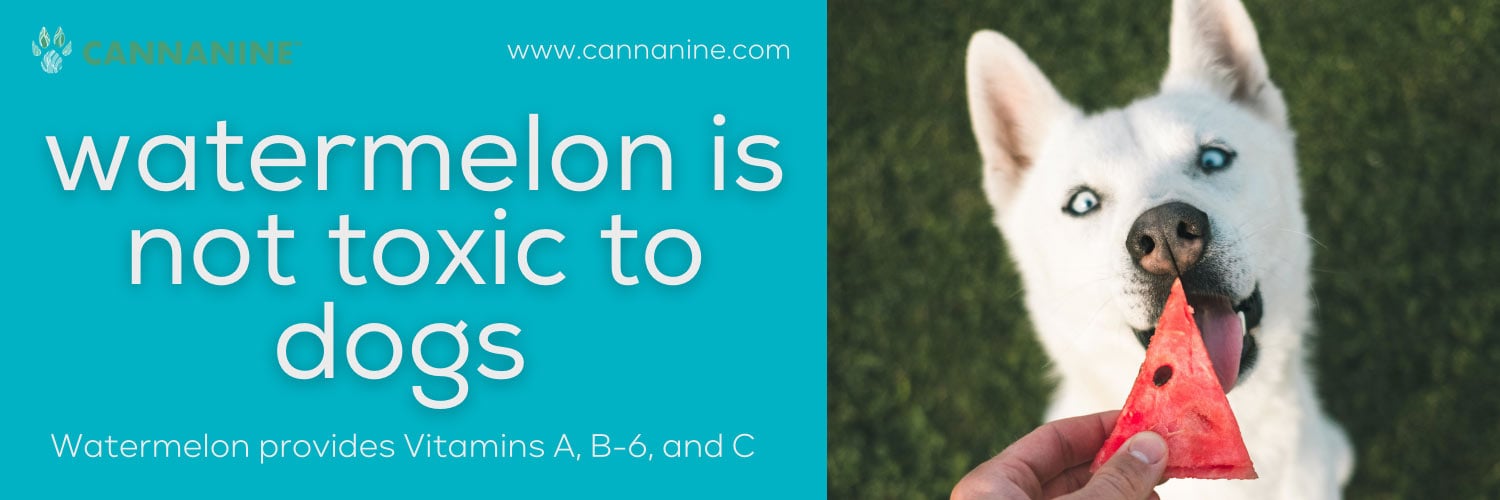
Dogs can eat watermelon—and they’ll look darn cute doing so, too. Just be sure to remove the rind and seeds before serving this snack. Those parts are bad for intestinal health, but the watermelon flesh is totally safe.
Watermelon provides Vitamins A, B-6, and C.
Of course, watermelon is mostly just water (92%), so the main benefit of watermelon is hydration on a hot summer afternoon.
Can Dogs Eat Coconut?
Coconut meat and oil are non-toxic for canines. Coconut brings some nice health benefits, too.
It’s packed with antioxidants that support immune system health. It’s also high in lauric acid, which helps the body fight off infections and viruses.
The main drawback with coconut is that it contains oils that can be rough on the tummy. Too much coconut can lead to bloating or diarrhea. If that’s the case, then you’ll likely conclude that coconut’s harm outweighs the good.
Can Dogs Eat Ice Cream?
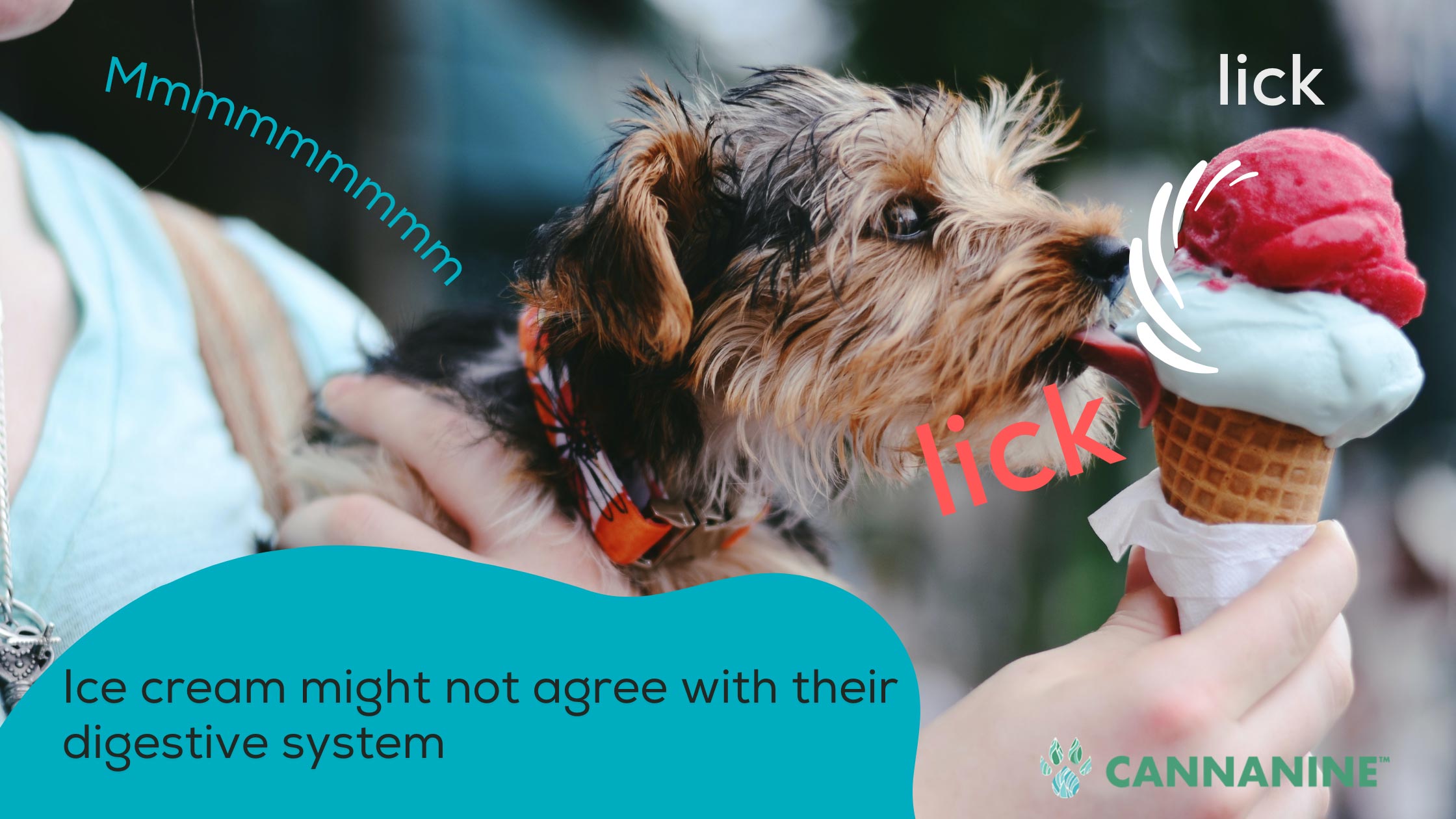
Lots of pups love ice cream just as much as we do. Likewise, it’s not a healthy food for us… or for them.
Some dogs are intolerant to lactose/dairy. If so, ice cream might not agree with their digestive system.
There’s also lots of sugar in ice cream. High-sugar diets lead to weight gain and other problems.
Don’t turn to sugar-free ice cream, either. That’s likely to be loaded with artificial sweeteners that are worse for dogs than regular sugar.
Never feed a dog chocolate ice cream, either, as chocolate is not safe for dogs.
So, a bit of vanilla ice cream can be okay as a treat. But it’s best to mostly avoid this sugary snack.
Is Cheese Bad For Dogs?
You’ve probably known some doggos that go bonkers for cheese. It’s a fan favorite, but is it safe?
In moderation, cheese is okay for most dogs. Even if your dog is lactose intolerant, bits of cheese might be okay. Just monitor how they feel afterward to see if cheese stays on your pet’s approved foods list.
If cheese isn’t causing an upset stomach, then it can be a special treat. Since small little bites can drive a dog wild, cheese is a great treat to use during training activities.
Can Dogs Eat Cabbage?
Cabbage is safe and healthy. That includes red, green, and white varieties. It’s fine raw or cooked.
Cabbage is full of vitamins and nutrients. Research has also shown that cruciferous veggies like cabbage help reduce cancer risk in canines.
So, if your pup likes cabbage, it’s a healthy snack. The only downside? Just like many human foods dogs enjoy, cabbage can cause some gas.
Is Milk Bad For Dogs?
If we’re referring to cow’s milk, there’s not a simple yes/no answer.
Puppies drink their mother’s milk, of course. But puppies carry lots of the enzyme lactase, which is present to help them break down their all-milk diet while nursing. Later in life, dogs produce much less lactase and are therefore suited for much less milk intake.
So, adult pooches can have a hard time digesting milk. Many are lactose intolerant, resulting in symptoms like gas and diarrhea after drinking milk.
Note that lactose-intolerant dogs will struggle with milk but may be okay with dairy products like cheese.
Your best bet is to limit milk to small amounts or avoid it entirely if you notice any ill effects.
Can Dogs Eat Pretzels?
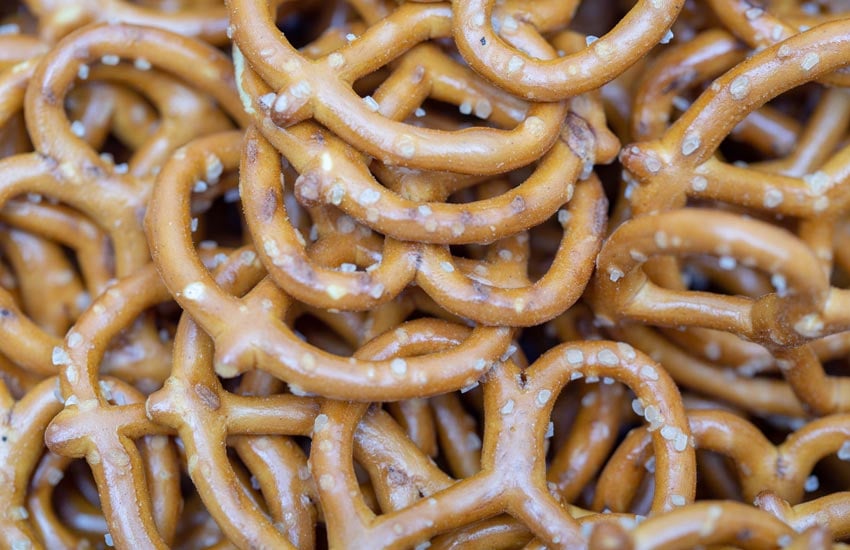
There are differing points of view on this one. On the one hand, pretzels are basically just a bread product. They’re not toxic or acutely harmful.
On the other hand, pretzels are usually salted. Salty foods make a thirsty pet. And too much salt can lead to vomiting, diarrhea, and even serious problems like seizures.
Even without the salt, pretzels are high in carbs and don’t offer much nutritional value. There are many better people-food options to share with your companion. So, it’s best not to offer up any pretzels or other salty snacks.
Can Dogs Eat Pasta?
Be careful with this one. “Pasta” is one word that can capture countless ingredients. Buttered noodles, mac, and cheese, fettuccine alfredo, marinara spaghetti… you get the idea.
Not to mention rice noodles, zucchini noodles, and so on.
As for plain, cooked, wheat-based noodles, then the answer is yes: pasta is safe for dogs. It’s not toxic or otherwise harmful.
However, nor is it part of a typical healthy canine diet. It’s carb-heavy, which is not ideal. So, a noodle here and there is fine, but don’t make meals out of it. And be careful, including sauces or other ingredients mixed with the noodles.
Can Dogs Eat Ketchup?
First of all, if your furry friend gets a taste of ketchup, they’ll likely be smitten. But is it an approved food?
This is another one that isn’t quite so simple as “yes” or “no.” Most popular ketchup brands don’t include any ingredients that could be toxic for dogs.
Ketchup typically consists of:
- Tomatoes
- Sugar
- Vinegar
- Seasonings, including onion powder and garlic powder
Dogs shouldn’t eat onions. Garlic isn’t advised, either. However, the amount of these seasonings in ketchup isn’t enough to cause concern from moderate intake.
The products to be extra wary of are ketchups labeled “sugar-free.” These often contain a sweetener such as xylitol, which is toxic for canines. So, if your ketchup of choice is sugar-free, it’s a humans-only condiment.
While regular ketchups are safe, they are high in sodium. A high-sodium diet isn’t good. So, it’s best not to go overboard with ketchup, even though your pup might have different opinions on the matter.
Can Dogs Eat Peanut Butter?
Peanut butter is safe for our four-legged pals, and they love it. It’s a classic treat that many of us remember sharing with our best buds when we were kids.
Peanut butter is high in salt, and it’s fattening. So, like most treats, share it in moderation. And avoid any brands that contain xylitol, an artificial sweetener. Xylitol is a highly toxic substance for dogs that can cause liver failure and death.
Can Dogs Eat Steak?
Steak provides:
- Protein
- Fatty acids
- Omega 6
All of the above are important for overall canine health. Just be sure to remove any bones that could be a choking hazard. Also, trim away excess fat, which can be difficult to digest.
Keep steak and other meats plain—some seasonings are unhealthy and potentially toxic for dogs.
Which Human Foods Make Safe And Unsafe Dog Foods?
People share all sorts of food with their pets. Sometimes wisely, sometimes not so wisely.
While the above is just a small selection, we’ve hit some of the foods that dog-owners most commonly wonder about.
Let’s sum up what we’ve covered:
| Can My Dog Eat This Food? | ||
| Safe In Moderate Amounts | Avoid Or Proceed With Caution | |
| Blueberries | X | |
| Strawberries | X | |
| Grapes | X | |
| Raisins | X | |
| Oranges | X | |
| Pineapple | X | |
| Potatoes | X | |
| Raw Chicken | X | |
| Rice | X | |
| Nuts | X | |
| Peas | X | |
| Carrots | X | |
| Spinach | X | |
| Watermelon | X | |
| Coconut | X | |
| Ice Cream | X | |
Of course, keep in mind that all food choices are more complex than simply “okay” or “not okay.” So, look out for your animal friend by doing your research on any new food that you introduce into their diet.
Health and Wellness for Dogs
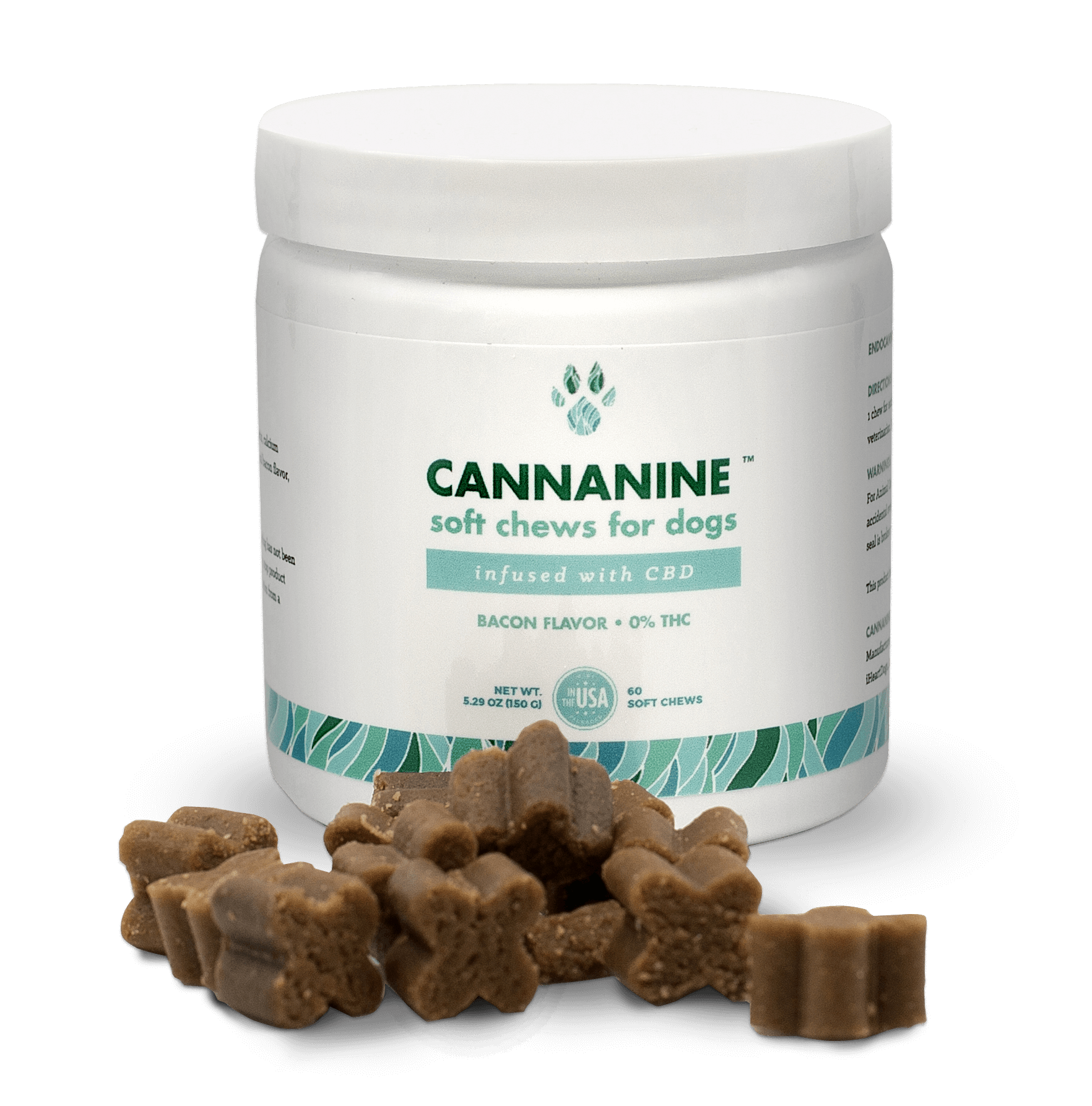
Diet is one of the key pillars of health and wellness for any pet. A protein-rich diet that meets all nutritional needs is crucial for a long and happy life.
High-quality dog food should be the main source of calories. Find a brand and product that’s a good fit, considering these factors:
- Breed
- Age
- Size
- Your veterinarian’s recommendations
For special treats and bonding moments, feel free to share some people food with your companion. Just make sure that it’s safe. Research the item and check for any potentially dangerous ingredients.
A balanced diet goes a long way. But many pups, like all people, will still encounter some physical and emotional challenges throughout their lifetimes.
Cannanine makes all-natural CBD wellness products for pooches who need help dealing with anxiety, pain, and other health concerns.
“Works WONDERS for our older dogs!” – Thomas, ★★★★★ reviewer
“Works well in calming our anxious fur babies.” – Valerie, ★★★★★ reviewer
CBD oil derived from hemp is legal in all 50 states. And it’s a game-changer for many dogs and their owners.
To learn more, read our Ultimate CBD Oil Guide for Dog Owners.
